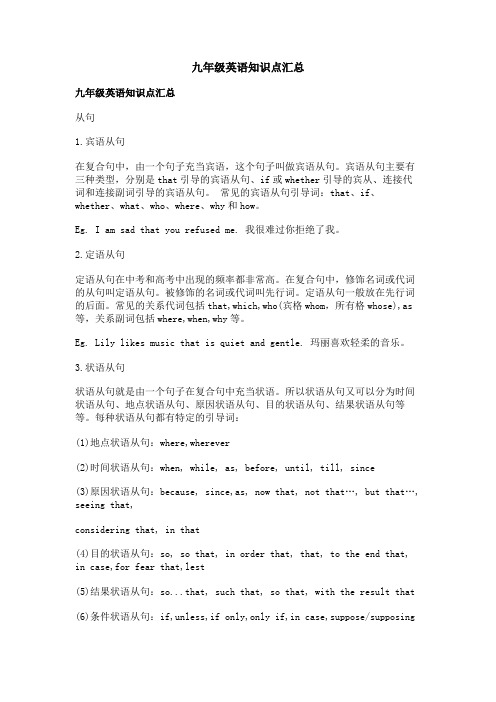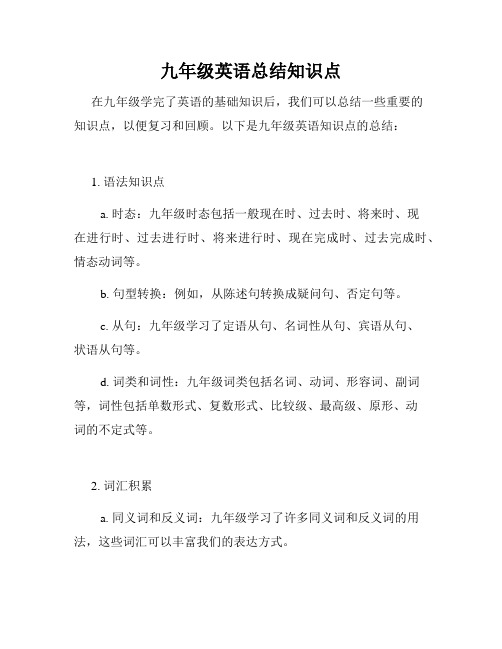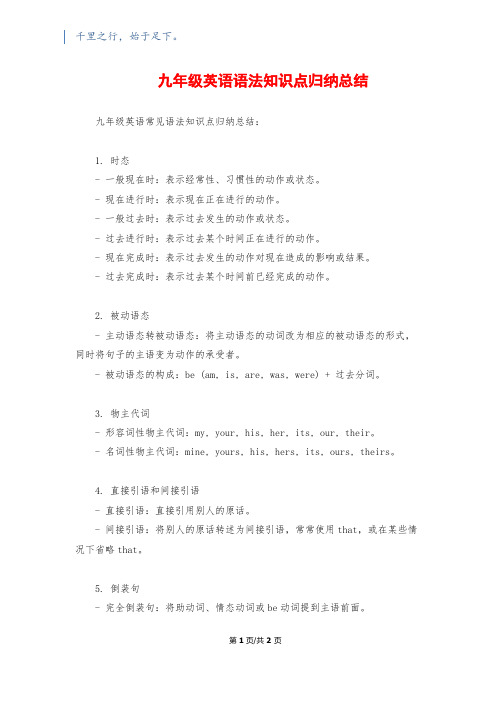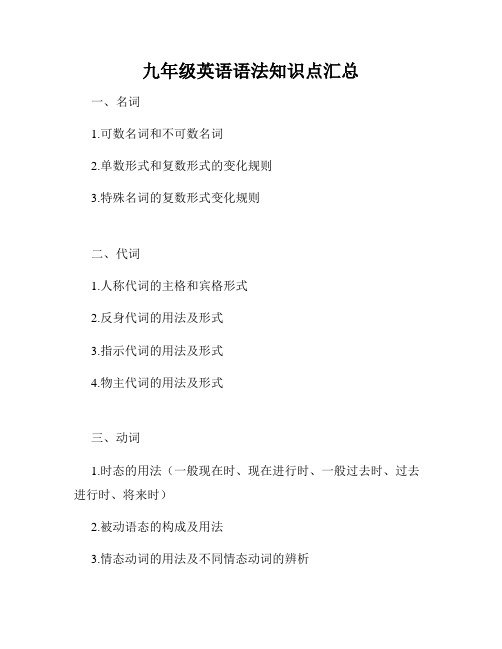九年级英语知识点汇总
九年级英语全册知识点大汇总

九年级英语全册知识点大汇总Unit1 How can we become good learners?【重点短语】1. have conversation with sb. 同某人谈话2. tooto 太而不能3. the secret to 的秘诀4. be afraid of doing sth./ be afraid to do sth. 可怕做某事5. look up 查阅6. repeat out loud 大声跟读7. make mistakes in 在方面犯错误8. connect with 把和连接/联系起来9. get bored 感到厌烦10. be stressed out 焦虑担忧的11. pay attention to 留意;关注12. depend on 取决于;依靠13. the ability to do sth.. 做某事的能力【考点详解】1. by + doing 通过方式(by是介词,后面要跟动名词,也就是动词的ing形式)2. talk about 谈论,议论,商议The students often talk about movie after class. 学生们常常在课后商议电影。
talk to sb= talk with sb 与某人说话3. 提建议的句子:①What/ how about +doing sth.? 做怎么样?(about后面要用动词的ing形式,这一点考试考的比较多)如:What/ How about going shopping?②Why dont you + do sth.? 你为什么不做?如:Why dont you go shopping?③Why not + do sth. ? 为什么不做?如:Why not go shopping?④Lets + do sth. 让我们做...吧。
如:Lets go shopping⑤Shall we/I + do sth.? 我们/我...好吗?如:Shall we/I go shopping?4. a lot 许多,常用于句末。
九年级英语知识点归纳整理

九年级英语知识点归纳整理一、语法知识点。
1. 被动语态。
- 结构:一般现在时的被动语态:am/is/are + 过去分词;一般过去时的被动语态:was/were+过去分词;一般将来时的被动语态:will be+过去分词;含有情态动词的被动语态:情态动词+be +过去分词。
- 用法:当不知道动作的执行者是谁,或者没有必要指出动作的执行者时,使用被动语态。
例如:The bridge was built last year.(不知道谁建的桥,只强调桥被建好了)2. 定语从句。
- 关系代词:that,which,who,whom,whose。
that既可以指人也可以指物;which指物;who指人,在从句中作主语;whom指人,在从句中作宾语;whose表示所属关系,“……的”。
例如:I like the book which/that was written by Lu Xun.(先行词book是物,关系代词可用which或that);The boy who/that is standing there is my brother.(先行词boy是人,关系代词可用who或that作主语)- 关系副词:when,where,why。
when在定语从句中作时间状语;where作地点状语;why作原因状语。
例如:I still remember the day when I first met her.(先行词day表示时间,关系副词用when);This is the place where we used to live.(先行词place表示地点,关系副词用where)3. 宾语从句。
- 语序:宾语从句要用陈述句语序,即“连接词+主语+谓语+其他”。
例如:He asked me where I was going.而不是He asked me where was I going.- 连接词:that(无意义,可省略,在从句中不作成分);if/whether(“是否”,在从句中不作成分);特殊疑问词(如what,when,where,why,how等,在从句中作相应的成分)。
九年级英语知识点汇总

九年级英语知识点汇总九年级英语知识点汇总从句1.宾语从句在复合句中,由一个句子充当宾语,这个句子叫做宾语从句。
宾语从句主要有三种类型,分别是that引导的宾语从句、if或whether引导的宾从、连接代词和连接副词引导的宾语从句。
常见的宾语从句引导词:that、if、whether、what、who、where、why和how。
Eg. I am sad that you refused me. 我很难过你拒绝了我。
2.定语从句定语从句在中考和高考中出现的频率都非常高。
在复合句中,修饰名词或代词的从句叫定语从句。
被修饰的名词或代词叫先行词。
定语从句一般放在先行词的后面。
常见的关系代词包括that,which,who(宾格whom,所有格whose),as 等,关系副词包括where,when,why等。
Eg. Lily likes music that is quiet and gentle. 玛丽喜欢轻柔的音乐。
3.状语从句状语从句就是由一个句子在复合句中充当状语。
所以状语从句又可以分为时间状语从句、地点状语从句、原因状语从句、目的状语从句、结果状语从句等等。
每种状语从句都有特定的引导词:(1)地点状语从句:where,wherever(2)时间状语从句:when, while, as, before, until, till, since(3)原因状语从句:because, since,as, now that, not that…, but that…, seeing that,considering that, in that(4)目的状语从句:so, so that, in order that, that, to the end that, in case,for fear that,lest(5)结果状语从句:so...that, such that, so that, with the result that(6)条件状语从句:if,unless,if only,only if,in case,suppose/supposing(that),provided/providing(that),on condition that,so/as long as(7)方式状语从句:as, as if, as though(8)让步状语从句:though, although, as, even if, even though, whether, no matterwhether...or, no matter with初中英语的学习技巧学会利用学习软件是学好初中英语的一个小技巧,尤其是现在有很多背单词的软件,非常的实用,可以帮助同学们随时随地的背单词,适合初中生的背单词软件有百词斩、墨墨背单词等等。
九年级英语总结知识点

九年级英语总结知识点在九年级学完了英语的基础知识后,我们可以总结一些重要的知识点,以便复习和回顾。
以下是九年级英语知识点的总结:1. 语法知识点a. 时态:九年级时态包括一般现在时、过去时、将来时、现在进行时、过去进行时、将来进行时、现在完成时、过去完成时、情态动词等。
b. 句型转换:例如,从陈述句转换成疑问句、否定句等。
c. 从句:九年级学习了定语从句、名词性从句、宾语从句、状语从句等。
d. 词类和词性:九年级词类包括名词、动词、形容词、副词等,词性包括单数形式、复数形式、比较级、最高级、原形、动词的不定式等。
2. 词汇积累a. 同义词和反义词:九年级学习了许多同义词和反义词的用法,这些词汇可以丰富我们的表达方式。
b. 词组和固定短语:九年级学习了一些常用的词组和固定短语,这些短语在写作和口语表达中非常有用。
c. 高频词汇:九年级时我们需要掌握更多的高频词汇,这些词汇在听力、阅读和写作中经常出现。
3. 阅读理解a. 短文阅读:九年级时,我们需要通过阅读短文来理解文章的主旨、细节和推理能力。
b. 阅读技巧:九年级时需要学习使用一些阅读技巧,如扫读、略读、推理等,以帮助我们更好地理解文章。
4. 口语和听力a. 会话练习:九年级时我们需要进行更多的口语练习,以提高自己的口语表达能力。
b. 听力理解:听力是九年级英语考试中的重点,我们需要通过听力练习来提高听力理解能力。
5. 写作技巧a. 写作结构:九年级时我们需要学习不同类型文章的写作结构,如记叙文、议论文、说明文等。
b. 书信写作:学习如何写不同类型的书信,包括感谢信、邀请信、建议信等。
总结九年级的英语知识点是为了更好地复习和回顾已学知识,帮助我们在高中阶段更快适应英语学习的难度。
通过不断的复习和练习,我们可以提高英语水平,并在学术和实际应用中取得成功。
这些知识点的总结可以帮助我们更好地复习和巩固已学知识。
随着九年级的结束,我们应该对所学的知识有一个清晰的了解,并持续努力提高自己在阅读、听力、口语和写作等方面的能力。
万唯九年级英语知识点汇总

万唯九年级英语知识点汇总一. 时态和语态1. Simple Present Tense 现在简单时态The Simple Present Tense is used to express habitual actions, general truths, and permanent situations.2. Present Continuous Tense 现在进行时态The Present Continuous Tense is used to describe actions that are happening at the moment of speaking.3. Simple Past Tense 过去简单时态The Simple Past Tense is used to talk about actions that happened at a specific time in the past.4. Past Continuous Tense 过去进行时态The Past Continuous Tense is used to describe actions that were in progress at a specific time in the past.5. Present Perfect Tense 现在完成时态The Present Perfect Tense is used to talk about actions that happened in the past but are still relevant to the present.6. Past Perfect Tense 过去完成时态The Past Perfect Tense is used to express an action that happened before a specific time in the past.7. Future Simple Tense 将来简单时态The Future Simple Tense is used to talk about actions that will happen in the future.8. Passive Voice 被动语态The Passive Voice is used when the subject of the sentence is acted upon by the verb.二. 语法1. Direct and Indirect Speech 直接引语和间接引语Direct speech is when we quote the exact words spoken by someone, while indirect speech is when we report what someone said without using their exact words.2. Relative Clauses 关系从句A relative clause is a type of subordinate clause that describes or provides more information about a noun.3. Reported Speech 被动语态Reported speech is used when we want to report what someone said in our own words.4. Conditionals 条件句Conditionals are sentences that express a condition and its result. There are different types of conditionals, including zero, first, second, third, and mixed conditionals.5. Modal Verbs 情态动词Modal verbs are auxiliary verbs that express necessity, possibility, ability, permission, and advice.三. 词汇和表达1. Synonyms 同义词Synonyms are words that have similar meanings.2. Antonyms 反义词Antonyms are words that have opposite meanings.3. Idioms and Phrases 成语和短语Idioms and phrases are expressions that have a figurative meaning different from their literal meaning.4. Collocations 固定搭配Collocations are words that are commonly used together.5. Word Formation 词汇构词Word formation refers to the process of creating new words or forms of words.四. 阅读理解1. Skimming and Scanning 略读和查读Skimming is the process of quickly going through a text to get a general idea of its content, while scanning is the process of searching for specific information in a text.2. Inferencing 推理Inferencing is the process of using clues in a text to make educated guesses or draw conclusions.3. Note-taking 笔记Note-taking is the process of summarizing important information while reading or listening.4. Multiple Choice Questions 多项选择题Multiple choice questions require the reader to choose the correct option from a list of choices.五. 写作技巧1. Paragraph Structure 段落结构A well-structured paragraph consists of a topic sentence, supporting sentences, and a concluding sentence.2. Cohesion and Coherence 连贯性和一致性Cohesion refers to the use of linking words and phrases to connect ideas within a text, while coherence refers to the logical flow of ideas in a text.3. Descriptive Writing 描述性写作Descriptive writing is used to create a vivid picture in the reader's mind by using sensory details and figurative language.4. Argumentative Writing 议论文写作Argumentative writing is used to persuade the reader to adopt a certain point of view or take a specific action.5. Narrative Writing 叙事写作Narrative writing is used to tell a story or recount a sequence of events.六. 口语表达1. Greetings and Introductions 问候和介绍Common greetings and introductions used in everyday conversations.2. Expressing Opinions 表达观点Useful phrases for expressing opinions and giving reasons in discussions or debates.3. Making Suggestions 提出建议Phrases and expressions for making suggestions in a polite and respectful manner.4. Asking for and Giving Directions 问路和给路Vocabulary and phrases for asking for and giving directions when navigating in a city.5. Making Apologies and Excuses 道歉和找借口Phrases and expressions for apologizing and making excuses in different situations.以上是万唯九年级英语知识点的汇总,包括时态和语态、语法、词汇和表达、阅读理解、写作技巧以及口语表达。
九年级英语知识点笔记汇总

九年级英语知识点笔记汇总一、名词 (Nouns)名词是指人、事物、地方或抽象概念的名称。
下面是一些名词的例子:1. 人名:Tom, Mary, John2. 物品:book, pen, computer3. 地方:school, park, city4. 抽象概念:love, happiness, friendship二、动词 (Verbs)动词用于描述动作、状态或事件。
下面是一些常见的动词:1. 动作:run, dance, read2. 状态:be, feel, sleep3. 事件:happen, occur, exist三、形容词 (Adjectives)形容词用于描述名词的性质或特征。
下面是一些常见的形容词:1. 外貌:beautiful, tall, young2. 性格:friendly, kind, patient3. 颜色:red, blue, green四、副词 (Adverbs)副词用于描述动词、形容词或其他副词的方式或程度。
下面是一些常见的副词:1. 方式:quickly, slowly, carefully2. 程度:very, extremely, quite五、代词 (Pronouns)代词用于替代名词,以避免重复。
下面是一些常见的代词:1. 主格:I, you, he, she, it2. 宾格:me, you, him, her, it3. 形容词性:my, your, his, her, its六、介词 (Prepositions)介词用于表示位置、方向、时间或关系。
下面是一些常见的介词:in, on, at, by, for, with七、连词 (Conjunctions)连词用于连接句子或短语。
下面是一些常见的连词:and, but, or, so, because八、冠词 (Articles)冠词用于限定名词。
下面是两种冠词:1. 定冠词:the2. 不定冠词:a, an九、时态 (Tense)英语动词根据时间的不同表达不同的时态,包括过去时、现在时和将来时。
九年级英语语法知识点归纳总结

千里之行,始于足下。
九年级英语语法知识点归纳总结九年级英语常见语法知识点归纳总结:1. 时态- 一般现在时:表示经常性、习惯性的动作或状态。
- 现在进行时:表示现在正在进行的动作。
- 一般过去时:表示过去发生的动作或状态。
- 过去进行时:表示过去某个时间正在进行的动作。
- 现在完成时:表示过去发生的动作对现在造成的影响或结果。
- 过去完成时:表示过去某个时间前已经完成的动作。
2. 被动语态- 主动语态转被动语态:将主动语态的动词改为相应的被动语态的形式,同时将句子的主语变为动作的承受者。
- 被动语态的构成:be (am, is, are, was, were) + 过去分词。
3. 物主代词- 形容词性物主代词:my, your, his, her, its, our, their。
- 名词性物主代词:mine, yours, his, hers, its, ours, theirs。
4. 直接引语和间接引语- 直接引语:直接引用别人的原话。
- 间接引语:将别人的原话转述为间接引语,常常使用that,或在某些情况下省略that。
5. 倒装句- 完全倒装句:将助动词、情态动词或be动词提到主语前面。
第1页/共2页锲而不舍,金石可镂。
- 部分倒装句:将助动词或be动词提到动词前面。
6. 从句- 名词性从句:在句子中充当名词的成分。
- 定语从句:在句子中充当定语的成分。
- 状语从句:在句子中充当状语的成分。
7. 并列连词和从属连词- 并列连词:连接意义相同的并列分句,如and, but, or, so等。
- 从属连词:连接主句与从句,如if, when, because, although等。
以上是九年级英语常见的语法知识点总结,希望能对你有所帮助!。
九年级英语重点知识点总结

九年级英语重点知识点总结一、语法知识点1. 被动语态- (1)构成:一般现在时的被动语态:am/is/are+过去分词;一般过去时的被动语态:was/were+过去分词;一般将来时的被动语态:will be+过去分词;含有情态动词的被动语态:情态动词+be+过去分词。
- (2)用法:强调动作的承受者。
例如:The bridge was built last year.(这座桥是去年建造的。
)2. 定语从句- (1)关系代词:who(先行词指人,在从句中作主语或宾语),whom(先行词指人,在从句中作宾语),which(先行词指物,在从句中作主语或宾语),that(先行词指人或物,在从句中作主语或宾语)。
例如:I like the bookwhich/that was written by Lu Xun.(我喜欢鲁迅写的那本书。
)- (2)关系副词:when(先行词表示时间,在从句中作时间状语),where (先行词表示地点,在从句中作地点状语),why(先行词为reason,在从句中作原因状语)。
例如:I still remember the day when we first met.(我仍然记得我们第一次见面的那一天。
)3. 宾语从句- (1)语序:宾语从句要用陈述句语序。
例如:He asked me where I was from.(他问我来自哪里。
)- (2)时态:主现从不限;主过从必过;客观真理用一般现在时。
例如:She says that she will go to Beijing tomorrow.(她说她明天将去北京。
);He said that he had seen the movie.(他说他已经看过这部电影了。
);The teacher told us that the earth goes around the sun.(老师告诉我们地球绕着太阳转。
)4. 情态动词- (1)must:表示必须,肯定推测(用于肯定句,意为“一定”)。
九年级全册英语笔记知识点

九年级全册英语笔记知识点一、单词拼写在学习英语的过程中,掌握单词的拼写是非常重要的。
以下是九年级全册中常见的一些单词及其拼写:1. Vocabulary (词汇)2. Grammar (语法)3. Pronunciation (发音)4. Comprehension (理解)5. Fluency (流利)6. Conversation (对话)7. Reading (阅读)8. Writing (写作)9. Listening (听力)10. Speaking (口语)二、语法知识点了解和掌握英语的基本语法规则对于正确的语言表达至关重要。
以下是九年级全册中常见的一些语法知识点:1. Present simple tense (一般现在时)2. Past simple tense (一般过去时)3. Present continuous tense (现在进行时)4. Past continuous tense (过去进行时)5. Future simple tense (一般将来时)6. Modal verbs (情态动词)7. Conditional sentences (条件句)8. Reported speech (间接引语)9. Passive voice (被动语态)10. Relative clauses (关系从句)三、阅读技巧阅读是提高英语能力的重要途径,以下是九年级全册中关于阅读的一些技巧和知识点:1. Skimming (略读)2. Scanning (快速查找)3. Guessing meaning from context (通过上下文猜词义)4. Identifying main ideas and supporting details (辨认主旨和主要细节)5. Making inferences (推断)6. Deducing vocabulary through prefixes and suffixes (通过前缀和后缀猜测单词意思)7. Understanding different text types (理解不同类型的文章)8. Making notes while reading (阅读时做笔记)四、写作技巧良好的写作技巧可以让我们更清晰、准确地表达自己的想法和观点。
九年级英语语法知识点汇总

九年级英语语法知识点汇总
一、名词
1.可数名词和不可数名词
2.单数形式和复数形式的变化规则
3.特殊名词的复数形式变化规则
二、代词
1.人称代词的主格和宾格形式
2.反身代词的用法及形式
3.指示代词的用法及形式
4.物主代词的用法及形式
三、动词
1.时态的用法(一般现在时、现在进行时、一般过去时、过去进行时、将来时)
2.被动语态的构成及用法
3.情态动词的用法及不同情态动词的辨析
四、形容词和副词
1.形容词的基本用法及比较级和最高级的构成
2.副词的基本用法及比较级和最高级的构成
3.形容词和副词的位置
五、介词和介词短语
1.常用介词的用法及常见短语的搭配
2.介词短语的位置和作用
六、连词和并列句
1.连词的分类和用法(并列连词、从属连词、对等连词)
2.并列句的构成及注意事项
七、从句和复合句
1.名词性从句的种类和用法(主语从句、宾语从句、表语从句)
2.定语从句的构成及引导词的使用
3.状语从句的分类及引导词的使用
八、倒装句和间接引语
1.完全倒装句和部分倒装句的构成及使用场景
2.直接引语和间接引语的转换
九、复习与补充
1.重点复习前面九个年级所学的语法知识点
2.补充其他有关九年级英语语法的知识
以上是九年级英语语法知识点的汇总,希望能帮助到你对这些知识点的理解和掌握。
在学习过程中,请多做练习和总结,以提高自己的语法能力。
祝你学习顺利!。
九年级全一册英语知识点总结

2. where I’m from , we’re pretty relaxed about time. 在我们那个地方,我们的时间观念比较随意
3. We often just drop by our friends’ homes. 我们时常去朋友家拜访
2. What do you like best about… What do you like best about the Dragon Boat Festival?
3. what a great day! 感叹句句:多么美好的一天!
4.I wonder if ….我想知道 I wonder if it’s similar to Water Festival of the Dai people
Unit 3 Could you please tell me where the restrooms are?
问路常用的句子: 1. Do you know where…is? 2. Can you tell me how I can get to…? 3. Could you tell me how to get to….? 4. Could /will/would you please tell me sth.? 例句: Could you tell me how to get to the park?
3. what do you dislike about this CD. 你不喜欢这张CD的什么?
4. what does it remind you of ? 它使你想起了什么?
5. it does have a few good features, though. 然而,他的确有好的方面
九年级英语全册知识点归纳

38.change one’s mind改变主意
39. in the end=at last最后
40. afford to do sth.担负得起
41. go to sleep入睡
43.be allowed to do sth.被允许做某事
44.chat with sb与某人聊天
16. spoken English英语口
17. make up组成
18. break off中断
19.make mistakes犯错误
20.change…into…把…..变成
21. look…up in a dictionary查字典
22. to begin with首先,第一
23.be afraid to do sth.害怕做…
188. shake hands握手
189.for the first time第一次
190. at first起初
191.a bit late稍晚一会儿
192.after all毕竟,终究
193.drop by顺便访问
194. be relaxed about在…方面随意
195.on time按时
148.in the dark在黑暗中
149. in this way这样
150.in the world在世界上
151. prefer…to…喜欢…胜于…
152.sprinkle…on…把…洒在…上
153. divide…into…把…分为
154.the number of……的数量
155.a number of…许多,大量
165. get married结婚
九年级全册英语知识点归纳

一、语法
1.一般现在时、一般过去时、一般将来时的使用和构成
2.现在进行时、过去进行时的构成和用法
3.现在完成时、过去完成时的构成和用法
4.直接引语和间接引语的转换
5.省略句的构成和使用
6.被动语态的构成和使用
7.定语从句和名词性从句的用法
8.感叹句和条件句的构成和用法
9.并列连词、从属连词和关系词的使用
10.数词、形容词、副词的用法和比较级、最高级的构成
11.介词和介词短语的使用
12.情态动词的用法和构成
二、词汇
1.各类词汇的拼写和发音规则
2.常用动词、名词、形容词、副词的用法和搭配
3.各类介词的用法
4.常用短语和习惯用语的应用
5.常用句型和固定搭配的用法
三、阅读理解
1.根据文章的标题、首句、尾句、关键词等进行文章的整体理解
2.根据上下文和词汇推测词义
3.理解和分析文章中的事实细节和主旨
4.分析和解答文章中的推理和引申问题
5.根据文章内容回答问题、总结归纳并进行有关话题的讨论
四、写作
1.根据提示和要求进行句子、短文的写作
2.根据图片或图表进行写作并描述所给信息
3.根据所学内容进行自由写作并流畅表达自己的观点
4.根据所给材料和要求进行信件、日记、倒序叙述等不同文体的写作
5.使用复杂句型和连接词进行段落和篇章的组织和衔接
以上仅是九年级全册英语知识点的一部分,每个单元和课文中还涉及很多具体的语法点、词汇和表达方式。
在学习过程中,应该结合课本和习题进行练习和巩固,才能更好地掌握这些知识点。
同时,还需要注重拓宽自己的阅读广度和写作能力,提高语言的运用和表达能力。
九年级英语知识点总结

九年级英语知识点总结(一)1. Now big plans are being made to send up more satellites and even build a space station.现在中国正在计划发射更多的卫星,甚至建造一个空间站。
(1) 句子“are being made”是现在进行时的被动语态,结构“be being+过去分词”。
(2) 主动句中的宾补如果是不带to的不定式时,变成被动句后,成为主补的不定式必须带to,常见跟不带to的复合宾语的动词有see、feel、hear、make 等。
2. I’m moved by what Yang Liwei did. 我被杨利伟所做的事感动了。
(1) What Yang Liwei did 是介词by的宾语从句,意为“杨利伟所做的事”(2) be moved by 为……而感动如:The students are moved by the old man’s story.同学们为那位老人的故事而感动。
3. Generally speaking, we are in good health now.一般来说,我们现在的健康状况良好。
(1) generally speaking “一般来说、大体上、大概”(2) in good/bad health 处于好(不好)的身体状况。
如:He has a cold, he is always in bad health. 他感冒了,他的身体状况总是不好。
4. We couldn’t help looking at the earth again and again.我们忍不住再三地看着地球。
(1) can’t/couldn’t help doing sth. 忍不住做某事,不能停止做某事。
如:I can’t help crying. 我忍不住哭了。
(2) again and again 一再,屡次,如:The teacher has told him again and again.老师已屡次和他讲过了。
初中九年级英语知识点大全

初中九年级英语知识点大全一、词汇1. 名词:指人、物、地点、事物等。
如:apple(苹果)、student(学生)、beach(海滩)、book(书)等。
2. 动词:表示行为、状态或存在。
如:run(跑)、eat(吃)、be(是)等。
3. 形容词:描述名词的特征或性质。
如:beautiful(美丽的)、tall(高的)、happy(快乐的)等。
4. 副词:修饰动词、形容词、其他副词等。
如:slowly(慢慢地)、very(非常地)、often(经常地)等。
5. 代词:替代名词使用。
如:he(他)、she(她)、it(它)等。
6. 数词:表示数量。
如:one(一个)、two(两个)、ten(十)等。
7. 冠词:用来修饰名词。
如:a(一个)、an(一个,用于元音音素开头的名词)等。
8. 介词:用来描述名词与其他词之间的关系。
如:in(在)、on(在…上)、under(在…下)等。
9. 连词:连接词语、短语或句子。
如:and(和)、but(但是)、or(或者)等。
10. 感叹词:表示强烈的情绪或感觉。
如:wow(哇)、oh (哦)等。
二、语法1. 时态:英语中有现在时、过去时和将来时等多种时态,表示不同的动作发生时间。
2. 句型:英语中有陈述句、疑问句、祈使句和感叹句等不同的句型。
3. 从句:由连词引导,起到修饰、补充或扩展句子的作用。
如:I know that you are a good student.(我知道你是个好学生。
)4. 名词性从句:作为句子的主语、宾语或表语的从句。
如:What he said surprised me.(他说的话让我惊讶。
)5. 定语从句:用来修饰名词的从句,常由关系代词引导。
如:The book that I borrowed from the library is very interesting.(我从图书馆借的那本书非常有趣。
)6. 状语从句:用来修饰句子中的动词、形容词或副词的从句。
九年级中考英语知识点总结

九年级中考英语知识点总结一、词汇。
1. 重点单词。
- 动词。
- be动词(am/is/are/was/were):用于表示主语的状态(是……)。
例如:I am a student.(一般现在时);He was at home yesterday.(一般过去时)。
- have/has(had):表示“有”或完成时态中的助动词。
如:She has a book.(一般现在时);They have finished their work.(现在完成时)。
- do/does(did):可作助动词用于构成疑问句和否定句,也可作实义动词表示“做”。
例如:Do you like English?(一般现在时的一般疑问句);He did his homework last night.(一般过去时)。
- 名词。
- 可数名词:有单复数形式。
如:book - books,student - students。
规则变化一般在词尾加 -s或 -es(以s、x、ch、sh结尾的加 -es等),不规则变化需要特殊记忆,如:man - men,child - children。
- 不可数名词:没有复数形式,如:water,rice,information等。
表示数量时,用量词,如:a glass of water,two pieces of information。
- 形容词和副词。
- 形容词用于修饰名词,如:a beautiful flower。
副词用于修饰动词、形容词或其他副词,如:He runs quickly.;She is very beautiful. 形容词和副词的比较级和最高级:- 规则变化:一般在词尾加 -er(比较级)、-est(最高级);以重读闭音节结尾且词尾只有一个辅音字母的,双写该辅音字母再加 -er、-est;以“辅音字母 +y”结尾的,把y变为i再加 -er、-est。
例如:big - bigger - biggest;hot - hotter - hottest;easy - easier - easiest。
九年级英语全册知识点大汇总

1.语法知识点:-时态:一般现在时、一般过去时、一般将来时、现在进行时、过去进行时、现在完成时、过去完成时、将来完成时等。
-名词:可数和不可数名词、复数名词的构成规则、名词所有格等。
-代词:人称代词、物主代词、反身代词、指示代词、不定代词等。
-形容词和副词:比较级和最高级、形容词和副词的用法和位置等。
-介词:常见的介词及其用法、介词短语等。
-冠词:定冠词和不定冠词的用法和位置等。
-动词:不规则动词的过去式和过去分词形式、情态动词的用法等。
-从句:宾语从句、主语从句、定语从句、状语从句等。
-名词性从句:主语从句、宾语从句、表语从句、同位语从句等。
-倒装:部分倒装、完全倒装等。
2.句型转换:- 肯定句变否定句:在动词前加助动词“do not”或“does not”。
- 否定句变疑问句:将助动词“do not”或“does not”置于主语之前。
- 一般疑问句变陈述句:将助动词“do”或“does”去掉。
-特殊疑问句的构成和回答方式。
3.宾语从句:- 引导词:that, if, whether等。
-时态和语序:宾语从句中的时态和主句的主谓一致,语序和陈述句一样。
4.定语从句:- 引导词:关系代词who, whom, whose, which, that等;关系副词where, when, why等。
-关系代词和关系副词的选择和使用。
-非限制性定语从句和限制性定语从句的区别和用法。
-定语从句中的时态和语序。
5.状语从句:- 引导词:时间状语从句(when, while, before, after, since, until等)、条件状语从句(if, unless, as long as, in case等)、地点状语从句(where, wherever等)、方式状语从句(as, as if, as though等)、原因状语从句(because, since, as等)、结果状语从句(so that, such… that等)等。
九年级全册英语知识点归纳

九年级全册英语知识点归纳一、名词(Noun)名词是指表示人、物、事物、地点等具体或抽象概念的名称。
在句子中可作主语、宾语、表语、定语或宾补等。
1. 可数名词(Countable Nouns)和不可数名词(Uncountable Nouns)可数名词可以用单数或复数形式表示;不可数名词只有单数形式。
2. 特殊名词特殊名词是指表示某一类事物或人的名称,例如国名、姓氏等。
它们的复数形式有其自身的规则。
二、代词(Pronoun)代词是用来代替名词的词语,可以用来指示、提及、引用以及回避。
1. 主格代词(Subjective Pronouns)主格代词用来作主语。
2. 宾格代词(Objective Pronouns)宾格代词用来作宾语。
3. 物主代词(Possessive Pronouns)物主代词用来表示所有关系。
4. 反身代词(Reflexive Pronouns)反身代词单独使用表示强调,同时也可以作为宾语。
三、动词(Verb)动词是指表示行为、状态或存在的词语。
作为句子的核心,它可以有不同的时态、语态和情态。
1. 时态(Tense)时态是动词表达的时间概念,包括一般现在时、一般过去时、一般将来时等。
2. 语态(Voice)语态是指动作的执行者和承受者之间的关系,包括主动语态和被动语态。
3. 情态(Modal Verbs)情态动词用来表示可能性、能力、建议、允许等。
四、形容词(Adjective)形容词用来描述名词或代词,提供关于其性质、特征或状态的信息。
1. 形容词的比较级和最高级形容词可以有原级、比较级和最高级形式,用来表示不同程度的大小、高低等。
五、副词(Adverb)副词用来修饰动词、形容词、其他副词或全句,表示时间、地点、方式、原因等。
1. 频度副词(Adverbs of Frequency)频度副词用来表示动作发生的频率。
六、介词(Preposition)介词连接名词、代词或动词与其他词,表达时间、地点、方式、原因等。
九年级英语必考语法知识点整理归纳大全(复习重点)

九年级英语必考语法知识点整理归纳大全(复习重点)一. 宾语从句1. 宾语从句的含义在整个句子中做宾语的从句叫做宾语从句。
如:She knew that the teacher had seen the film.她知道这位老师看过这部电影。
(“that the teacher had seen the film”做knew 的宾语,同时又是由连接词that 引导的从句,所以它叫做宾语从句。
)2. 宾语从句的分类(1)动词宾语从句:顾名思义,它是位于动词后面的宾语从句。
例如:He asked whose handwriting was the best in our class.他问我们班上谁的书法最好。
(2)介词宾语从句:顾名思义,它是位于介词后面的宾语从句。
例如:I agree with what you said just now.我同意你刚才说的话。
(3)形容词宾语从句:顾名思义,它是位于形容词后面的宾语从句。
例如:I am afraid that I will be late. 恐怕我要迟到了。
3. 引导名词性从句的连接词(1)that:没有含义,在宾语从句中不做成分(2)whether/if:表示是否,在宾语从句中不做成分。
I don't know if /whether he still lives here after so many years. 我不知道这么多年后,他是否还住在这里。
(3)连接代词:what, which, who, whom, whose(在宾语从句中做主、宾、表和定语)连接副词:where, when, how, why(在宾语从句中做状语)The small children don't know what is in their stockings.(what 在宾语从句中做主语)这些小孩子不知道什么在他们的长筒袜里。
Could you tell me why you were late for the meeting this morning? (why 在宾语从句中做原因状语)你能告诉我为什么你今天早上开会迟到吗?4. 在做宾语从句的题目时应注意两点(1)时态①当主句是现在时态时,宾语从句可以根据需要使用任何时态。
- 1、下载文档前请自行甄别文档内容的完整性,平台不提供额外的编辑、内容补充、找答案等附加服务。
- 2、"仅部分预览"的文档,不可在线预览部分如存在完整性等问题,可反馈申请退款(可完整预览的文档不适用该条件!)。
- 3、如文档侵犯您的权益,请联系客服反馈,我们会尽快为您处理(人工客服工作时间:9:00-18:30)。
九年级英语知识点汇总Unit11. by + doing通过……方式如:by studying with a groupby 还可以表示:“在…旁”、“靠近”、“在…期间”、“用、”“经过”、“乘车”等如:I live by the river. I have to go back by ten o’clock.The thief entered the room by the window.The student went to park by bus.2. talk about 谈论,议论,讨论如:The students often talk about movie after class.学生们常常在课后讨论电影。
talk to sb. === talk with sb. 与某人说话3. 提建议的句子:①What/ how about +doing sth.?如:What/ How about going shopping?②Why don’t you + do sth.?如:Why don’t you go shopping?③Why not + do sth. ? 如:Why not go shopping?④Let’s + do sth. 如:Let’s go shopping⑤Shall we/ I + do sth.?如:Shall we/ I go shopping?4. a lot 许多常用于句末如:I eat a lot. 我吃了许多。
5. too…to 太…而不能常用的句型too+adj./adv. + to do sth.如:I’m too tired to say anything. 我太累了,什么都不想说。
6. aloud, loud与loudly的用法三个词都与"大声"或"响亮"有关。
①aloud是副词,重点在出声能让人听见,但声音不一定很大,常用在读书或说话上。
通常放在动词之后。
aloud没有比较级形式。
如: He read the story aloud to his son.他朗读那篇故事给他儿子听。
②loud可作形容词或副词。
用作副词时,常与speak, talk,laugh等动词连用,多用于比较级,须放在动词之后。
如:She told us to speak a little louder. 她让我们说大声一点。
③loudly是副词,与loud同义,有时两者可替换使用,但往往含有令人讨厌或打扰别人的意思,可位于动词之前或之后。
如:He does not talk loudly or laugh loudly in public. 他不当众大声谈笑。
7. not …at all 一点也不根本不如:I like milk very much. I do n’t like coffee at all. 我非常喜欢牛奶。
我一点也不喜欢咖啡。
not经常可以和助动词结合在一起,at all 则放在句尾8. be / get excited about sth.=== be / get excited about doing sth.=== be excited to do sth. 对…感兴奋如:I am / get excited about going to Beijing.===I am excited to go to Beijing. 我对去北京感到兴奋。
9. ①end up doing sth 终止做某事,结束做某事如:The party ended up singing. 晚会以唱歌而结束。
②end up with sth. 以…结束如:The party ended up with her singing. 晚会以她的歌唱而告终。
10. first of all 首先. to begin with 一开始later on 后来、随也、而且(用于肯定句)常在句子的中间也(用于否定句)常在句末(用于肯定句) 常在句末12. make mistakes 犯错如:I often make mistakes. 我经常犯错。
make a mistake 犯一个错误如:I have made a mistake.我已经犯了一个错误。
13. laugh at sb. 笑话;取笑(某人)如:Don’t laugh at me!不要取笑我!14. take notes 做笔记,做记录15. enjoy doing sth .喜欢做…乐意做…如:1She enjoys playing football. 她喜欢踢足球。
enjoy oneself 过得愉快如:He enjoyed himself. 他过得愉快。
16. native speaker 说本族语的人17. make up 组成、构成18. one of +(the+ 形容词比较级)+名词复数形式…其中之一如:She is one of the most popular teachers.她是最受欢迎的教师之一。
19. It’s +形容词+(for sb. ) to do sth. (对于某人来说)做某事…如:It’s difficult (for me ) to study English.对于我来说学习英语太难了。
句中的it 是形式主语,真正的主语是to study English 20. practice doing 练习做某事如:She often practice speaking English. 她经常练习说英语。
21. decide to do sth. 决定做某事如:LiLei has decided to go to BeiJing . 李雷已经决定去北京。
22. unless 假如不,除非引导条件状语从句如:You will fail unless you work hard..假如你不努力你会失败。
I won’t write unless he writes first. 除非他先写要不我不写23. deal with 处理如:I dealt with a lot of problem.24. worry about sb./ sth. 担心某人/ 某事如:Mother worried about his son just now.妈妈刚才担心他的儿子。
25. be angry with sb. 对某人生气如:I was angry with her. 我对她生气。
26. perhaps === maybe 也许27. go by (时间) 过去如:Two years went by. 两年过去了。
28. see sb. / sth. doing看见某人正在做某事强调正在发生see sb. / sth. do看见某人在做某事如:如:She saw him drawing a picture in the classroom.她看见他正在教室里画画。
29. each other 彼此30. regard… as …把…看作为….如:The boys regarded Anna as a fool. 这些男孩把安娜看成傻瓜。
31. too many许多修饰可数名词如:too many girlstoo much许多修饰不可数名词如:too much milkmuch too太修饰形容词如:much too beautiful32. change…into…将…变为…如:The magician changed the pen into a book.这个魔术师将这本书变为一本书。
33. with the help of sb. == with one’s help 在某人的帮助下如:with the help of LiLei == with LiLei’s help在李雷的帮助下34. compare … to …把…与…相比如:Compare you to Anna, you are lucky.你和安娜相比,你是幸运的。
35. instead 代替用在句末,副词(字面上常不译出来)instead of sth. / doing sth. 代替,而不是用在句中,动词如:Last summer I went to Beijing. This year I’m going to Shanghai instead.去年夏天我去北京, 今年我将要去上海。
I will go instead of you. 我将代替你去。
He stayed at home instead of going swimming.他呆在家里而不是去游泳。
九年级英语Unit21. used to do sth. 过去常常做某事否定形式:didn’t use to do sth. / used not to do sth.如:He used to play football after school. 放学后他过去常常踢足球。
Did he use to play football? Yes, I did. No, I didn’t.He didn’t use to smoke. 他过去不吸烟。
2. 反意疑问句23①肯定陈述句+否定提问 如:Lily is a student, isn ’t she? Lily will go to China, won ’t she? ②否定陈述句+肯定提问 如:She doesn ’t come from China, does she? You haven’t finished homework, have you?③提问部分用代词而不用名词 Lily is a student, isn ’t she?④陈述句中含有否定意义的词,如:little, few, never, nothing, hardly 等。
其反意疑问句用肯定式。
如:He knows little English, does he ? 他一点也不懂英语,不是吗?They hardly understood it, did they ?他们几乎不明白,不是吗? 3. play the piano 弹钢琴4. ①be interested in sth. 对…感兴趣②be interested in doing sth. 对做…感兴趣如:He is interested in math, but he isn ’t interested in speaking English. 他对数学感兴趣,但是他对说英语不感兴趣。
5. interest ed adj. 感兴趣的,指人对某事物感兴趣,往往主语是人 interest ing adj.有趣的,指某事物/某人具有趣味,主语往往是物 6. still 仍然,还用在be 动词的后面 如:I ’m still a student. 用在行为动词的前面 如:I still love him. 8. 害怕I am terrified of the dog.如:I am terrified of speaking. 9. on 副词,表示(电灯、电视、机械等)在运转中/打开, 其反义词off. with the light on 灯开着10. walk to somewhere 步行到某处 walk to school 步行到学校 11. spend 动词,表示“花费金钱、时间”①spend …on sth. 在某事上花费(金钱、时间)②spend …doing sth. 花费(金钱、时间)去做某事 如: He spends too much time on clothes. 他花费太多的时间在衣着He spend 3 months building the bridge.他花费了三个月去建这座桥。
